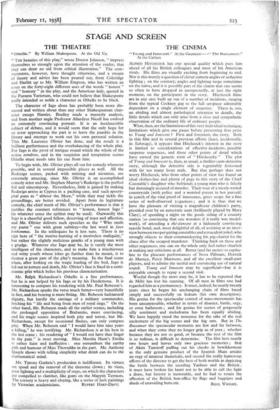STAGE AND SCREEN
THE THEATRE
"Othello." By William Shakespeare. At the Old Vic
`. THE beauties of this play," wrote Doctor Johnson, " impress themselves so strongly upon the attention of the reader, that they can draw no aid from critical illustration." The com- mentators, however, have thought otherwise, and a stream of theory and advice has been poured out, from Coleridge and Hazlitt up to Mr. William Empson, who has written an essay on the forty-eight different uses of the words " honest " and " honesty " in the play, and the American lady, quoted in the Furness Variorum, who could not believe that Shakespeare really intended so noble a character as Othello to be black.
The character of Iago alone has probably been more dis- cussed and written about than any other Shakespearean char- acter except Hamlet. Bradley made a masterly analysis, and from another angle Professor Allardyce Nicoll has evolved an extremely convincing portrait. It is an inexhaustible subject of debate, and it would seem that the only hope for an actor approaching the part is to leave the pundits in the library and attempt to work out his own personal solution. This Mr. Laurence Olivier has done, and the result is a brilliant performance and the overbalancing of the whole play. For Iago is the pivot of intrigue round which the whole of the action revolves, and in the suspicion and temptation scenes Othello must needs take his cue from him.
To begin with, Mr. Olivier plays all out for comedy wherever possible, and in several impossible places as well. All the Roderigo scenes, packed with miming and nictation, are extremely amusing, since Mr. Olivier is an accomplished comedy actor and Mr. Stephen Murray's Roderigo is the perfect foil and nincompoop. Nevertheless, little is gained by making Roderigo arrive at Cyprus in a packing case, and such apocry- phal puns as " abhoor the Moor," while they may tickle the groundlings, are better avoided. Apart from its legitimate comedy, the chief merit of Mr. Olivier's performance is that it justifies the constant references to " honest, honest Iago " (in whatever sense the epithet may be used). Outwardly this lago is a cheerful good fellow, deserving of trust and affection, and Mr. Olivier delivers such speeches as the " Who steals my purse " one with great subtlety—the last word in faux bonhommes. In the soliloquies he is less sure. There is no sign here of " the motive-hunting of a motiveless malignity," but rather the slightly malicious wanks of a young man with a grudge. Whatever else Iago ,may be, he is surely the most intelligent of the characters, and to make him a mischievous and witty youth whose jokes go further than he meant, is to destroy a great part of the play's meaning. In the final scene when, after looking on the tragic loading of the bed, Iago is led out to torture and death, Mr. Olivier's face is fixed in a semi- maniac gtin-Which belies his previous characterisation.
Mr. Ralph Richardson's Othello is a fine performance, but he is not helped by his lago or by his Desdemona. It is interesting to compare his rendering with Mr. Paul Robeson's. Mr. Richardson speaks the verse much better—very beautifully in fact, and his bearing is more fitting. Mr. Robeson had natural dignity, but hardly the carriage of a military commander, fetching his " life and being from men of royal siege." On the other hand, Mr. Robeson made all the earlier scenes, including the prolonged opposition of Brabantio, more convincing, and his tragic scenes inspired both pity and terror, but Mr. Richardson, except for occasional flashes, can only compass pity. When Mr. Robeson said " I would have him nine years a killing," he was terrifying. Mr. Richardson is at his best in the last scene ; his rendering of " I would not have thee linger in thy pain " is most moving. Miss Martha Hunt's Emilia is rather faint and ineffective : one remembers the earthy pith and humour of Miss Thorndike in the part. Mr. Anthony Quayle shows with telling simplicity what drink can do to the mathematical mind.
Mr. Tyrone Guthrie's production is indifferent. Its virtues are speed and the removal of the tiresome clown ; its vices, poor lighting and a multiplicity of steps, on which the characters are compelled to clamber, like goats on the Mappin Terraces. The scenery is heavy and cloying, like a series of lush paintings


















































 Previous page
Previous page